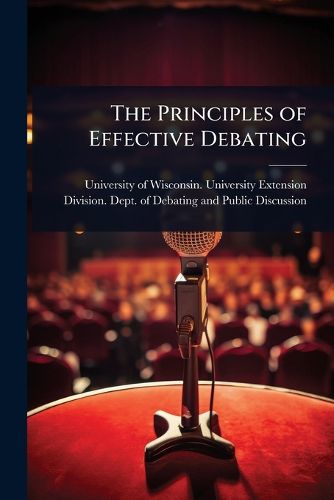Readings Newsletter
Become a Readings Member to make your shopping experience even easier.
Sign in or sign up for free!
You’re not far away from qualifying for FREE standard shipping within Australia
You’ve qualified for FREE standard shipping within Australia
The cart is loading…






"The Principles of Effective Debating," originally published in 1912 by the University of Wisconsin's Extension Division, offers a comprehensive guide to the art and science of argumentation. Designed for students and practitioners alike, this manual delves into the fundamental elements of constructing persuasive arguments, engaging in effective public speaking, and mastering the techniques of debate. From structuring logical arguments to employing rhetorical devices, the text covers a wide range of essential skills.
This volume provides practical advice on researching, organizing, and presenting arguments in a clear and compelling manner. Whether you are a student honing your debating skills or a professional seeking to improve your communication abilities, this book offers timeless wisdom and proven strategies for success. Explore the nuances of argumentation and discover the principles that underpin effective debating.
This work has been selected by scholars as being culturally important, and is part of the knowledge base of civilization as we know it. This work was reproduced from the original artifact, and remains as true to the original work as possible. Therefore, you will see the original copyright references, library stamps (as most of these works have been housed in our most important libraries around the world), and other notations in the work.
This work is in the public domain in the United States of America, and possibly other nations. Within the United States, you may freely copy and distribute this work, as no entity (individual or corporate) has a copyright on the body of the work.
As a reproduction of a historical artifact, this work may contain missing or blurred pages, poor pictures, errant marks, etc. Scholars believe, and we concur, that this work is important enough to be preserved, reproduced, and made generally available to the public. We appreciate your support of the preservation process, and thank you for being an important part of keeping this knowledge alive and relevant.
$9.00 standard shipping within Australia
FREE standard shipping within Australia for orders over $100.00
Express & International shipping calculated at checkout
"The Principles of Effective Debating," originally published in 1912 by the University of Wisconsin's Extension Division, offers a comprehensive guide to the art and science of argumentation. Designed for students and practitioners alike, this manual delves into the fundamental elements of constructing persuasive arguments, engaging in effective public speaking, and mastering the techniques of debate. From structuring logical arguments to employing rhetorical devices, the text covers a wide range of essential skills.
This volume provides practical advice on researching, organizing, and presenting arguments in a clear and compelling manner. Whether you are a student honing your debating skills or a professional seeking to improve your communication abilities, this book offers timeless wisdom and proven strategies for success. Explore the nuances of argumentation and discover the principles that underpin effective debating.
This work has been selected by scholars as being culturally important, and is part of the knowledge base of civilization as we know it. This work was reproduced from the original artifact, and remains as true to the original work as possible. Therefore, you will see the original copyright references, library stamps (as most of these works have been housed in our most important libraries around the world), and other notations in the work.
This work is in the public domain in the United States of America, and possibly other nations. Within the United States, you may freely copy and distribute this work, as no entity (individual or corporate) has a copyright on the body of the work.
As a reproduction of a historical artifact, this work may contain missing or blurred pages, poor pictures, errant marks, etc. Scholars believe, and we concur, that this work is important enough to be preserved, reproduced, and made generally available to the public. We appreciate your support of the preservation process, and thank you for being an important part of keeping this knowledge alive and relevant.